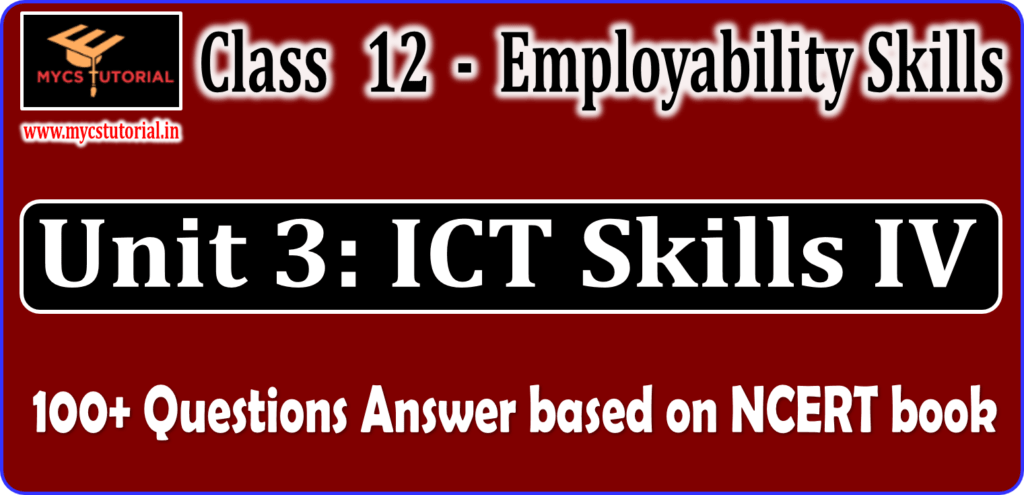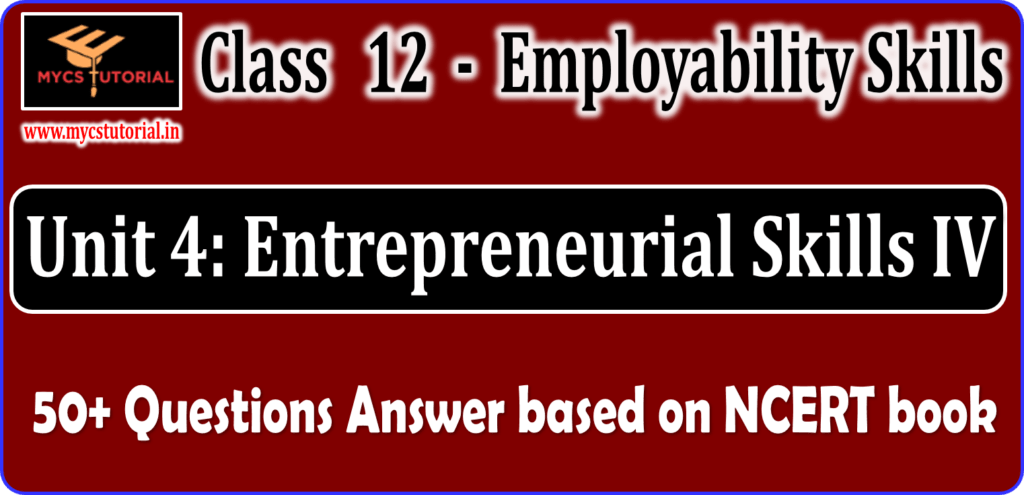Class 12 Employability Skills
Unit 1: Communication Skills – IV
Important Question Answer
1. What is Communication?
Answer: Communication is the act of conveying meanings from one entity or group to another through the use of mutually understood signs, symbols, and semiotic rules.
2. How many types of communication?
Answer: There are mainly two types of communication. These are
(a) Verbal Communication & (b) Non-Verbal Communication
3. What are the learning objectives of effective communication?
Answer: The learning objective of effective communication are –
- Development of Interpersonal Skills
- To express effectively & with maximum efficiency
4. What do you mean by Active Listening?
Answer: Active listening is the practice of preparing to listen, observing what verbal and non-verbal messages are being sent, and then providing appropriate feedback for the sake of showing attentiveness to the message being presented.
Active listening will help build and maintain relationships, solve problems, improve processes and retain information such as instructions, procedures and expectations.
5. Why Active Listening is important for us?
Answer: Active listening is important for us, because –
- It helps us build connections.
- It helps you build trust.
- It helps you identify and solve problems.
6. Write the four steps of Active Listening.
Answer: Active listening requires four discrete steps. These are –
- CONTACT—connect with the participant who is contributing; eye contact, open posture, and nonverbal responses.
- ABSORB—take in all aspects of the spoken message, implicit and explicit and nonverbal clues. Do not judge or evaluate.
- REFLECTIVE FEEDBACK—mirror, reflect, or feedback what you have heard and why the contributor claims to be valid.
- CONFIRM—receive confirmation from the speaker that you heard the participant’s message accurately. If not, start the method over again at the beginning by having the speaker restate their view.
7. Write the rules of Active Listening.
Answer: Rules of Active listening are –
Looks Like:-
- Eyes on speaker
- Still bodies and hands on lap or table.
- Appropraite expression.
- Raising your hand to speak.
Sounds Like:-
- One voice at a time.
- Appropriate coments and questions.
- Quiet bodies.
- Inside voices
- Waiting to be called on to speak.
8. What do you mean by Interviewing skills?
Answer: Interviewing is a skill in and of itself, one in which our ability to interact with the interviewer and to articulate our thoughts are factors that are just as important in getting the job as are the qualifications listed on our resume.
9. Write the top 7 Interview skills.
Answer: Top 7 Interview skills are –
- (i) Prepare
- (ii) Be Punctual
- (iii) Think before speaking
- (iv) Speak clearly, cohesively, and calmly
- (v) Be confident not arrogant
- (vi) Listen well
- (viii) Express gratitude.
10. What to do before an interview?
Answer: To do before an interview are –
- Get a good night’s sleep the night before.
- Do research.
- Eat a good breakfast.
- Prepare questions beforehand.
- Know who will be interviewing and learn a bit about their background.
- Know your strengths and put together a list of them.
- Turn off your cell phone
- Prepare a solid list of references
11. What to do during the beginning of an interview?
Answer: To do during the beginning of an interview are –
- Do try to sparkle! Use gestures in your conversation. Make sure they are smooth and emphatic.
- Do smile.
- Do make sure you get the interview’s name right and use it a few times in the interview
- Do go to the restroom before you visit the employment lobby. It is embarrassing to interrupt an interview, and you want to be as comfortable as possible
12. What to do during an interview?
Answer: During an interview, you can do the following –
- Do look the interviewer in the eye. Recruiters place a lot of emphasis on eye contact.
- Do take notes
- Let your achievements speak for you.
- Take a second before answering a question.
- Sit up straight.
- Ask questions.
13. What to do after an interview?
Answer: After the interview, you can do the following –
- Do let the interviewer decide when the interview is over.
- Do ask the interviewer when you will hear from him or her again if he or she does not offer the information.
- Drop off a thank you note. Always thank the interviewer after you have left.
- Follow up appropriately.
- Create a list of items that you did well and you like to improve on.
14. Write the don’ts of an interview?
Answer: The don’ts of the interview are –
- Don’t be late.
- Don’t sit down until you are asked.
- Don’t lean on or put your elbows on the interviewer’s desk.
- Sit back in your chair.
- Sit erect.
- Don’t show your nervousness by drumming your fingers, swing your leg, or cracking your knuckles.
- Don’t talk too quickly
- Don’t digress from your points. Answer questions directly.
- Don’t use words that meaning you do not know.
- Do not use slang.
15. How can you teach interview skills in high school?
Answer: To teach interview skills to high school students, follow these steps –
- Introduce interview skills
- Talk about why good interview skills matter
- Explore what good job interview skills look like
- Group project
- A practical, and interactive activity for participants to learn how to prepare for a job interview.
- This activity will help them avoid some common mistakes before or during a job interview.










